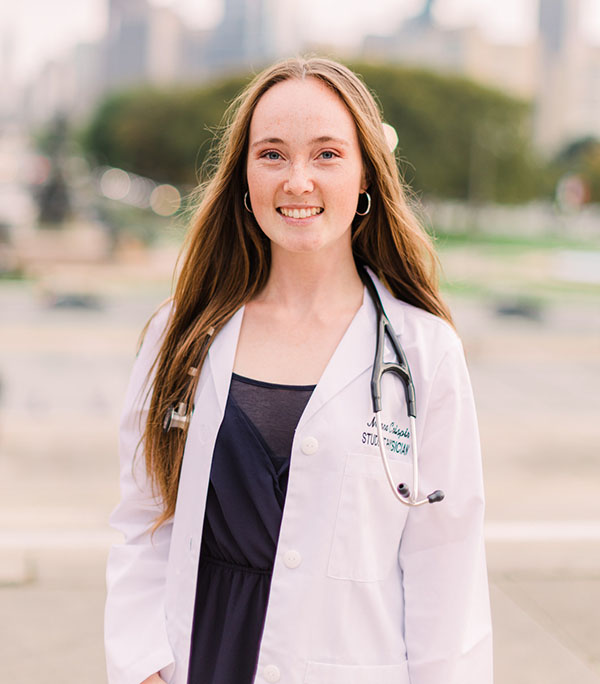Eye to the Future
First Year DO Student Jumps into Vision Research
February 14, 2023Mara Crispin (DO '25) has been interested in ophthalmology since middle school. As
an undergraduate at the University of Delaware, she studied cells in the lens of the
eye. Once she was accepted to Philadelphia College of Osteopathic Medicine (PCOM)
for medical school, she searched online to find out whether PCOM researchers study vision.
The answer: Big yes. The laboratory of Chief Research and Science Officer Mindy George-Weinstein, PhD, and Jacquelyn Gerhart, MS, director of the bioimaging facility and coordinator of
research support staff at PCOM's Philadelphia campus, discovered Myo/Nog cells, which
regulate embryonic development and participate in wound healing. In collaboration
with Arturo Bravo Nuevo, PhD, an associate professor of neuroscience, the team showed that Myo/Nog cells protect
neurons in the retina and brain. But Myo/Nog cells can also contribute to disease
by forming contractile myofibroblasts that distort tissue architecture.
Gerhart said that, in her nearly three decades at PCOM, Crispin was perhaps the first
student who had solidified arrangements to assist in the lab before she even took
her first class. Crispin's explanation: As a student you have to get used to balancing
research, studying and being involved in committees right away.
“I knew that once I got started with medical school it would be hard to squeeze research
in while taking classes. I wanted to be involved in research as soon as I got there
so it's already on my schedule,” she said. “And I'm really glad I did that.”
She should be. Crispin is first author of a new article, “Myo/Nog cells give rise to myofibroblasts during epiretinal membrane formation in
a mouse model of proliferative vitreoretinopathy,” which she co-authored with Gerhart, George-Weinstein, Bravo-Nuevo, PCOM research
support staff member Mark Martin, Ajay E. Kuriyan, MD, of Wills Eye Hospital, Alison
Heffer of the University of Rochester Medical Center and Nancy J. Philp, PhD, of Thomas
Jefferson University.
In the study, the research team concludes that Myo/Nog cells differentiate into myofibroblasts
that contract and produce retinal folds and detachment, which if not repaired immediately,
leads to blindness. With further studies, the findings could lead to pharmacological
approaches that target Myo/Nog cells to prevent or treat proliferative vitreoretinopathy.
The article graces the cover of the February 2023 edition of Investigative Ophthalmology & Visual Science.
Crispin is in the lab practically every week performing experiments involving analyses
of ocular tissues. Her efforts have contributed to three decades of pioneering research on the origin and functions of Myo/Nog cells.
“To have someone who made time to do the hands-on work with us, and was able to interpret
her results and understand their potential therapeutic applications, was really fantastic,”
Gerhart said.
George-Weinstein said she is seeing more first-year medical students—especially those
who want to apply for competitive residency programs—jumping right into research,
as scientific accomplishments make a difference in the matching process.
Crispin has taken it a step further, not only engaging in research but also shadowing
multiple surgeries at Wills Eye Hospital with Kuriyan, a co-author on the latest study.
“This gave me firsthand experience viewing numerous retinal surgeries with an ophthalmologist
who was happy to explain them to me and mentor me in my path toward ophthalmology,”
Crispin said, adding that her “number one decision-factor in choosing a medical school
was matching with ophthalmology.”
“Continuing vision research while in school was the cherry on top,” she said.
About Philadelphia College of Osteopathic Medicine
Established in 1899, Philadelphia College of Osteopathic Medicine (PCOM) has trained
thousands of highly competent, caring physicians, health practitioners and behavioral
scientists who practice a “whole person” approach to care—treating people, not just
symptoms. PCOM, a private, not-for-profit accredited institution of higher education,
operates three campuses (PCOM, PCOM Georgia and PCOM South Georgia) and offers doctoral degrees in clinical psychology, educational psychology, osteopathic
medicine, pharmacy, physical therapy, and school psychology. The college also offers
graduate degrees in applied behavior analysis, applied positive psychology, biomedical
sciences, forensic medicine, medical laboratory science, mental health counseling,
physician assistant studies, and school psychology. PCOM students learn the importance
of health promotion, research, education and service to the community. Through its
community-based Healthcare Centers, PCOM provides care to medically underserved populations.
For more information, visit pcom.edu or call 215-871-6100.
Contact Us
For general media inquiries, please contact the Office of Marketing and Communications
at 215-871-6300 or communications@pcom.edu. Visit our media relations page to view contact information for public relations personnel.
Connect with PCOM

 Mara Crispin (DO '25) has been interested in ophthalmology since middle school. As
an undergraduate at the University of Delaware, she studied cells in the lens of the
eye. Once she was accepted to Philadelphia College of Osteopathic Medicine (PCOM)
for
Mara Crispin (DO '25) has been interested in ophthalmology since middle school. As
an undergraduate at the University of Delaware, she studied cells in the lens of the
eye. Once she was accepted to Philadelphia College of Osteopathic Medicine (PCOM)
for 